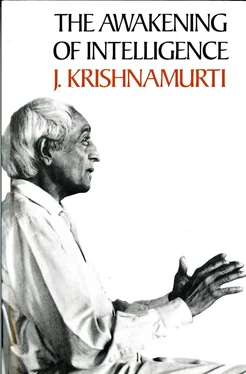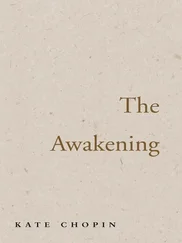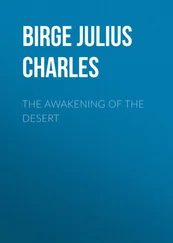Needleman: I have to learn that.
KRISHNAMURTI: No, no.
Needleman: I have to learn, don’t I?
KRISHNAMURTI: What is there to learn?
Needleman: I have to learn the futility of this conflict.
KRISHNAMURTI: No. What is there to learn? You yourself see that that moment of beauty becomes a memory, then the memory says, “It was so beautiful I must have it again.” You are not concerned with beauty, you are concerned with the pursuit of pleasure. Pleasure and beauty don’t go together. So if you see that, it is finished. Like a dangerous snake, you won’t go near it again.
Needleman: ( Laughs ) Perhaps I haven’t seen it, so I can’t say.
KRISHNAMURTI: That is the question.
Needleman: Yes, I think that must be so, because one keeps going back again and again.
KRISHNAMURTI: No. This is the real thing. If I see the beauty of that light, and it is really extraordinarily beautiful, I just see it. Now with that same quality of attention I want to see myself. There is a moment of perception which is as beautiful as that. Then what happens?
Needleman: Then I wish for it.
KRISHNAMURTI: Then I want to capture it, I want to cultivate it, I want to pursue it.
Needleman: And how to see that?
KRISHNAMURTI: Just to see that is taking place is enough.
Needleman: That’s what I forget!
KRISHNAMURTI: It is not a question of forgetting.
Needleman: Well, that is what I don’t understand deeply enough. That just the seeing is enough.
KRISHNAMURTI: Look, Sir. When you see a snake what takes place?
Needleman: I am afraid.
KRISHNAMURTI: No. What takes place? You run, kill it, do something. Why? Because you know it is dangerous. You are aware of the danger of it. A cliff, better take a cliff, an abyss. You know the danger of it. Nobody has to tell you. You see directly what would happen.
Needleman: Right.
KRISHNAMURTI: Now, if you see directly that the beauty of that moment of perception cannot be repeated, it is over. But thought says, “No, it’s not over, the memory of it remains.” So what are you doing now? You are pursuing the dead memory of it, not the living beauty of it—right? Now if you see that, the truth of it—not the verbal statement, the truth of it—it is finished.
Needleman: Then this seeing is much rarer than we think.
KRISHNAMURTI: If I see the beauty of that minute, it is over. I don’t want to pursue it. If I pursue it, it becomes a pleasure. Then if I can’t get it, it brings despair, pain and all the rest of it. So I say, “All right, finished.” Then what takes place?
Needleman: From my experience, I’m afraid that what takes place is that the monster is born again. It has a thousand lives. ( Laughter .)
KRISHNAMURTI: No Sir. When did that beauty take place?
Needleman: The place when I saw without trying to change.
KRISHNAMURTI: When the mind was completely quiet.
Needleman: Yes.
KRISHNAMURTI: Wasn’t it? Right?
Needleman: Yes.
KRISHNAMURTI: When you looked at that, your mind was quiet, it didn’t say, “I wish I could change it, copy it and photograph it, this, that, and the other”—you just looked. The mind wasn’t in operation. Or rather, thought wasn’t in operation. But thought comes immediately into operation. Now one has asked, “How can thought be quiet? How can one exercise thought when necessary, and not exercise it when it is not necessary?”
Needleman: Yes, that question is intensely interesting to me, Sir.
KRISHNAMURTI: That is, why do we worship thought? Why has thought become so extraordinarily important?
Needleman: It seems able to satisfy our desires; through thought we believe we can satisfy.
KRISHNAMURTI: No, not from satisfaction. Why has thought in all cultures with most people become of such vital concern?
Needleman: One usually identifies oneself as thought, as one’s thoughts. If I think about myself I think about what I think, what kind of ideas I have, what I believe. Is this what you mean?
KRISHNAMURTI: Not quite. Apart from identification with the “me”, or with “not me”, why is thought always active?
Needleman: Ah, I see.
KRISHNAMURTI: Thought is always operating in knowledge, isn’t it? If there was no knowledge, thought would not be. Thought is always operating in the field of the known. Whether mechanical, non-verbal and so on, it is always working in the past. So my life is the past, because it is based on past knowledge, past experience, past memories, pleasure, pain, fear and so on—it is all the past. And the future I project from the past, thought projects from the past. So thought is fluctuating between the past and the future. All the time it says, “I should do this, I should not do that, I should have behaved.” Why is it doing all this?
Needleman: I don’t know. Habit?
KRISHNAMURTI: Habit. All right. Go on. Let’s find out. Habit?
Needleman: Habit brings what I call pleasure.
KRISHNAMURTI: Habit, pleasure, pain.
Needleman: To protect me. Pain, yes pain.
KRISHNAMURTI: It is always working within that field. Why?
Needleman: Because it doesn’t know any better.
KRISHNAMURTI: No. No. Can thought work in any other field?
Needleman: That sort of thought, no.
KRISHNAMURTI: No, not any thought. Can thought work in any other field except in the field of the known?
Needleman: No.
KRISHNAMURTI: Obviously not. It can’t work in something I don’t know; it can only work in this field. Now why does it work in this? There it is, Sir—why? It is the only thing I know. In that there is security, there is protection, there is safety. That is all I know. So thought can only function in the field of the known. And when it gets tired of that, as it does, then it seeks something outside. Then what it seeks is still the known. Its gods, its visions, its spiritual states—all projected out of the known past into the future known. So thought always works in this field.
Needleman: Yes, I see.
KRISHNAMURTI: Therefore thought is always working in a prison. It can call it freedom, it can call it beauty, it can call it what is likes! But it is always within the limitations of the barbed-wire fence. Now I want to find out whether thought has any place except in there. Thought has no place when I say, “I don’t know.” “I really don’t know.” Right?
Needleman: For the moment.
KRISHNAMURTI: I really don’t know. I only know this, and I really don’t know whether thought can function in any field at all, except this. I really don’t know. When I say, “I don’t know”, which doesn’t mean I am expecting to know, when I say I really don’t know—what happens? I climb down the ladder. I become, the mind becomes, completely humble.
Now that state of “not knowing” is intelligence. Then it can operate in the field of the known and be free to work somewhere else if it wants to.
MALIBU, CALIFORNIA
26 MARCH 1971
__________________
1Jacob Needleman is Professor of philosophy at San Francisco State College; author of The New Religions , and editor of the Penguin Metaphysical Library.
2
ON INNER SPACE; ON TRADITION AND DEPENDENCE
Conversation between J. Krishnamurtiand Professor J. Needleman
Needleman: In your talks you have given a fresh meaning to the necessity for man to become his own authority. Yet cannot this assertion easily be turned into a form of humanistic psychology without reference to the sacred, transcendent dimension of human life on earth in the midst of a vast intelligent Cosmos? Must we not only try to see ourselves in the moment, but also as creatures of the Cosmos? What I am trying to ask about is this question of cosmic dimension.
Читать дальше












